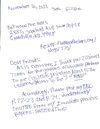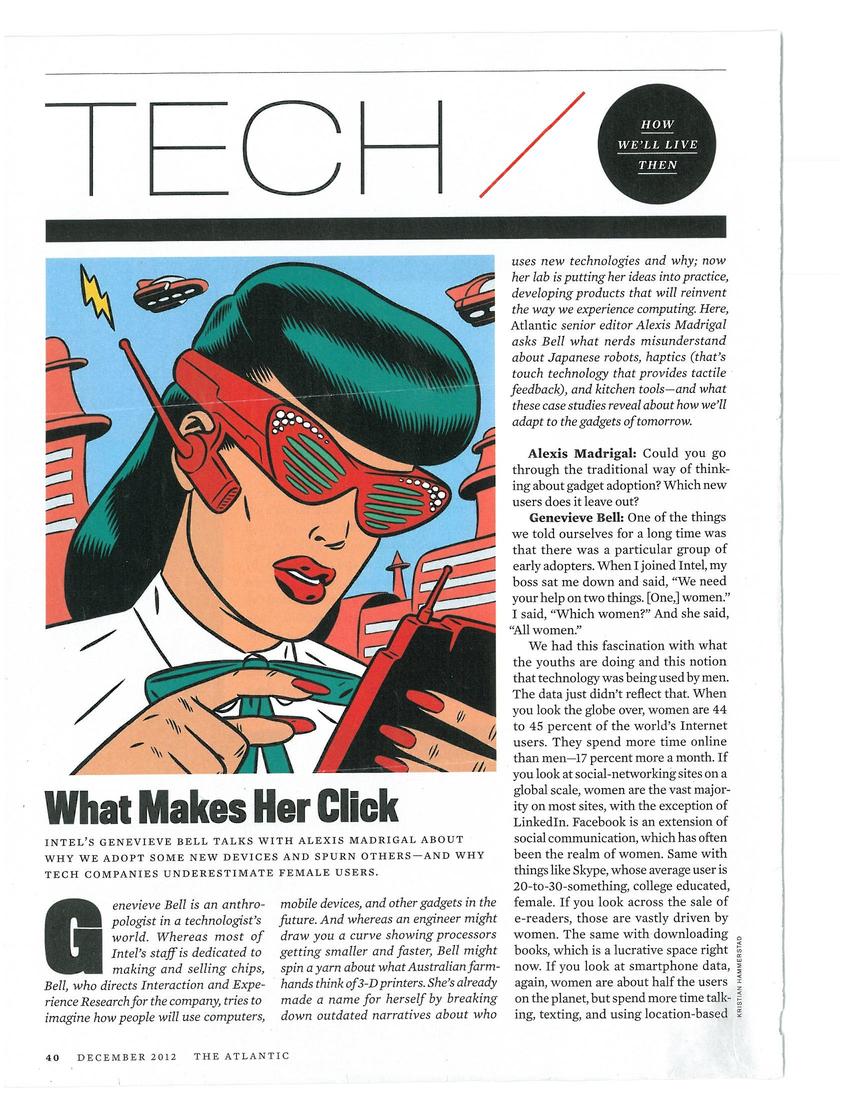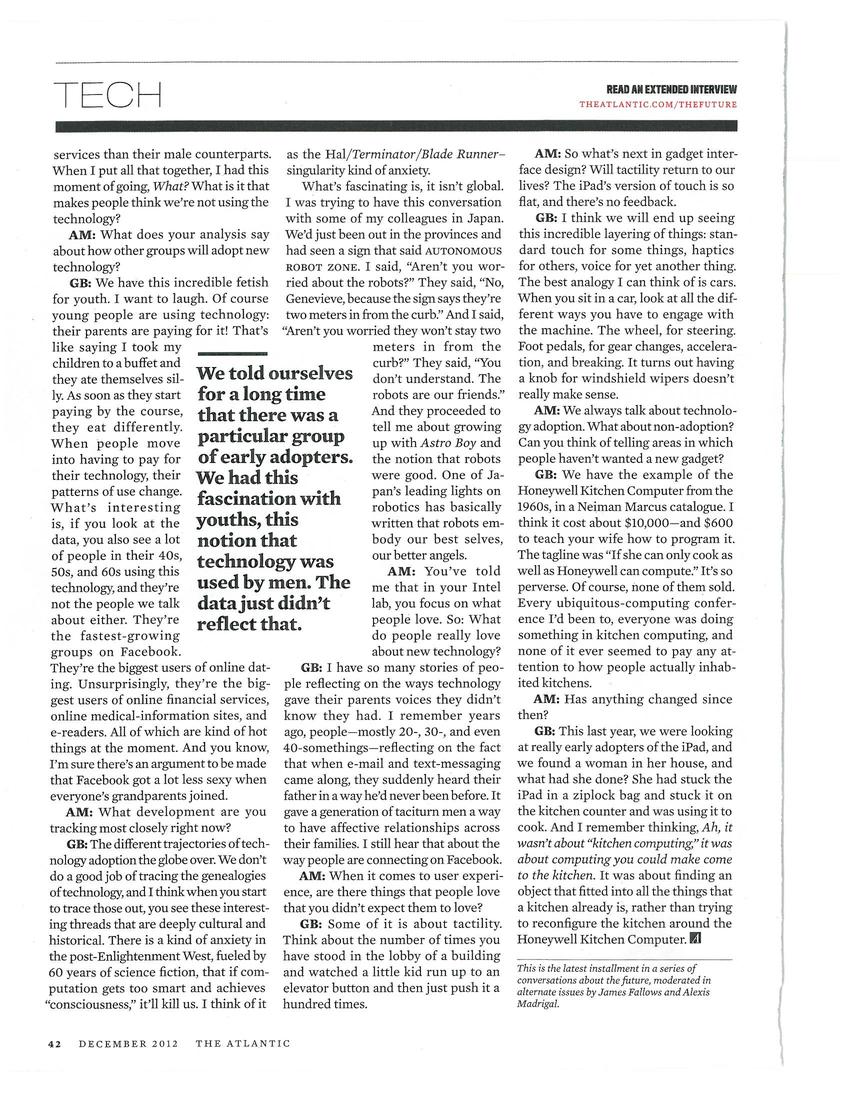
Transcription
TECH/ How We'll Live Then
What Makes Her Click
Intel's Genevieve Bell talks with Alexis Madrigal about why we adopt some new devices and spurn others - and why tech companies underestimate female users.
Genevieve Bell is an anthropologist in a technologist's world. Whereas most of Intel's staff is dedicated to making and selling chips, Bell, who directs Interaction and Experience Research for the company, tries to imaging how people will use computers, mobile devices, and other gadgets in the future. And whereas an engineer might draw you a curve showing processors getting smaller and faster, Bell might spin a yarn about what Australian farmhands think of 3-D printers. She's already made a name for herself by breaking down outdated narratives about who uses new technologies and why; now her lab is putting her ideas into practice, developing products that will reinvent the way we experience computers. Here, Atlantic senior editor Alexis Madrigal asks Bell what nerds misunderstand about Japanese robots, haptics (that's touch technology that provides tactile feedback), and kitchen tools - and what these case studies reveal about how we'll adapt to the gadgets of tomorrow.
Alexis Madrigal: Could you go through the traditional way of thinking about gadget adoption? What users does it leave out?
Genevieve Bell: One of the things we told ourselves for a long time was that there was a particular group of early adopters. When I joined Intel, my boss sat me down and said, "We need your help on two things. [One,] women." I said, "Which women?" And she said, "All women."
We had this fascination with what the youths are doing and this notion that technology was being used by men. The data just didn't reflect that. When you look the globe over, women are 44 to 45 percent of the world's Internet users. They spend more time online than me - 17 percent more a month. If you look at social-networking sites on a global scale, women are the vast majority on most sites, with the exception of LinkedIn. Facebook is an extension of social communication, which has often been the realm of women. Same with things like Skype, whose average user is 20-to-30-something, college educated, female. If you look across the sale of e-readers, those are vastly drive by women. The same with downloading books, which is a lucrative space right now. If you look at smartphone data, again, women are about half the users on the planet, but spend more time talking, texting, and using location-based services of their male counterparts. When I put all that together, I had this moment of going, WHAT? What is it that makes people think we're not using the technology?
AM: What does your analysis say about how other groups will adopt new technology?
GB: We have this incredible fetish for youth. I want to laugh. Of course young people are using technology: their parents are paying for it! That's like saying I took my children to a buffet and they ate themselves silly. As soon as they start paying by the course, they eat differently. When people move into having to pay for their technology, their patterns of use change. What's interesting is, if you look at the data, you also see a lot of people in their 40s, 50s, and 60s using this technology, and they're not the people we talk about either. They're the fastest-growing groups on Facebook. They're the biggest users of online dating. Unsurprisingly, they're the biggest users of online financial services, online medical-information sites, and e-readers. All of which are kind of hot things at the moment. And you know, I'm sure there's an argument to be made that Facebook got a lot less sexy when everyone's grandparents joined.
AM: What development are you tracking most closely right now?
GB: The different trajectories of technology adoption the globe over. We don't do a good job of tracing the genealogies of technology, and I think when you start to trace those out, you see these interesting threads that are deeply cultural and historical. There is a kind of anxiety in the post-Enlightenment West, fueled by 60 years of science fiction, that if computation gets too smart and achieves "consciousness", it'll kill us. I think of it as the Hal/Terminator/Blade Runner-singularity kind of anxiety.
What's fascinating is, it isn't global. I was trying to have this conversation with some of my colleagues in Japan. We'd just been out in the provinces and had seen a sign that said AUTONOMOUS ROBOT ZONE. I said, "Aren't you worried about the robots?" They said, "No, Genevieve, because the sign says they're two meters in from the curb." And I said, "Aren't you worried they won't stay two meters in from the curb?" They said, "You don't understand. The robots are our friends." And they proceeded to tell me about growing up with Astro Boy and the notion that robots were good. One of Japan's leading lights on robotics has basically written that robots embody our best selves, our better angels.
AM: You've told me that in your Intel lab, you focus on what people love. So: What do people really love about new technology?
GB: I have so many stories of people reflecting on the way technology gave their parents voices they didn't know they had. I remember years ago, people - mostly 20-, 30-, and even 40-somethings, reflecting on the fact that when e-mail and text-messaging came along, they suddenly heard their father in a way he'd never been before. It gave a generation of taciturn men a way to have affective relationships across their families. I still hear that about the way people are connecting on Facebook.
AM: When it comes to user experience, are there things people love that you didn't expect them to love?
GB: Some of it is about tactility. Think about the number of times you have stood in the lobby of a building and watched a little kid run up to an elevator button and then just push it a hundred times.
AM: So what's next in gadget interface design? Will tactility return to our lives? The iPad's version of touch is so flat, and there's no feedback.
GB: I think we will end up seeing this incredible layering of things: standard touch for some things, haptics for others, voice for yet another thing. The best analogy I can think of is cars. When you sit in a car, look at all the different ways you have to engage with the machine. The wheel, for steering. Foot pedals, for gear changes, acceleration, and braking. It turns out having a knob for windshield wipers doesn't really make sense.
AM: We always talk about technology adoption. What about non-adoption? Can you think of telling areas in which people haven't wanted a new gadget?
GB: We have the example of the Honeywell Kitchen Computer from the 1960s, in a Neiman Marcus catalogue. I think it cost about $10,000 - and $600 to teach your wife how to program it. The tagline was "If she can only cook as well as Honeywell can compute." It's so perverse. Of course, none of them sold. Every ubiquitous-computing conference I'd been to, everyone was doing something in kitchen computing, and none of it ever seemed to pay any attention to how people actually inhabited kitchens.
AM: Has anything changed since then?
GB: This last year, we were looking at really early adopters of the iPad, and we found a woman in her house, and what had she done? She had stuck the iPad in a ziplock bag and stuck it on the kitchen counter and was using it to cook. And I remember thinking, Ah, it wasn't about "kitchen computing", it was about computing you could make come to the kitchen. It was about finding an object that fitted into all the things that a kitchen already is, rather than trying to reconfigure the kitchen around the Honeywell Kitchen Computer.
This is the latest installment in a series of conversations about the future, moderated in alternate issues by James Fallows and Alexis Madrigal.
December 2012 The Atlantic
Other posts by this author
|
2023 feb 1

|
2022 dec 14

|
2022 dec 12

|
2022 dec 10

|
2022 aug 31

|
2022 jun 22

|
More... |



Replies